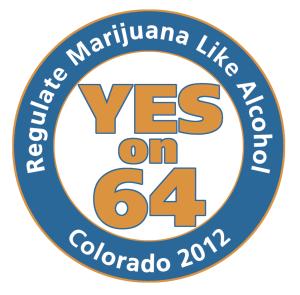And then there were two. It is now legal to possess up to an ounce of marijuana or grow six plants in Colorado. The Rocky Mountain State now joins Washington state, where it went legal last week.
Nonprofits including those in drug policy reform face continuing challenges in the tough economic environment. That means StoptheDrugWar.org and Drug War Chronicle need your support to do our job in 2013.
Medical marijuana is now one vote away from being legal in the Czech Republic after legislation passed the lower house of Parliament.
Lots of action -- good, bad, and ugly -- in California this week, plus a Washington appeals court ruling that appears to clear the way for dispensaries.
Former President Jimmy Carter is ready for states to legalize marijuana.
HSBC Bank has admitted laundering at least $881 million in drug cartel proceeds in a plea agreement with federal prosecutors that has resulted in the forfeiture of more than a billion dollars.
Nearly two-thirds of Americans oppose the federal government intervening to block marijuana legalization in the states, a new Gallup poll has found. Is the Obama administration listening?
A second poll in as many weeks shows limited support for federal intervention in Colorado and Washington, and a majority saying the feds should butt out.
An armed apparent marijuana dealer was shot and killed by Georgia police after he refused to put down his gun. That's drug war death #62 so far this year.
Another Border Patrol agent goes bad, an Orlando cop power trips his way to trouble, a former Texas cop has problems with sticky fingers, and the Philadelphia dope squad has made a real mess for prosecutors.
And then there were two. On Monday, December 10, 2012, Colorado Gov. John Hickenlooper signed an executive order certifying last month's Amendment 64 victory and legalizing the use, possession, and limited cultivation of marijuana by adults 21 and over.
Colorado now joins Washington as states where voters approved marijuana legalization last month and where the will of the voters has now become law. In both states, it is only the possession (and cultivation in Colorado) parts of the new laws that are now in effect. Officials in Denver and Olympia have a matter of some months to craft and enact regulatory schemes for commercial marijuana cultivation and distribution -- provided the federal government does not seek to block them from doing so.
While the federal government may seek to block implementation of regulations, it cannot make the two states
recriminalize marijuana possession. And the states have no obligation to enforce federal marijuana laws.
In both states, however, it remains illegal to sell marijuana or cultivate it commercially pending the enactment of regulatory schemes. Still, pot possession is now legal in Washington and Colorado.
"Voters were loud and clear on Election Day,"
Hickenlooper wrote. "We will begin working immediately with the General Assembly and state agencies to implement Amendment 64."
In addition to the executive order certifying the election results,
Hickenlooper also signed an
executive order establishing a 24-person task force charged with coming up with a way to implement Amendment 64's taxation and regulation provisions. The task force consists of government officials and other stakeholders, including representatives of medical marijuana patients, producers, and non-medical consumers, and will make recommendations to the legislature on how to establish a commercial marijuana market.
"All stakeholders share an interest in creating efficient and effective regulations that provide for the responsible development of the new marijuana laws," the executive order said. "As such, there is a need to create a task force through which we can coordinate and create a regulatory structure that promotes the health and safety of the people of Colorado."
Issues that will be addressed include: the need to amend current state and local laws regarding the possession, sale, distribution or transfer of marijuana and marijuana products to conform them to Amendment 64's decriminalization provisions; the need for new regulations for such things as security requirements for marijuana establishments and for labeling requirements; education regarding long-term health effects of marijuana use and harmful effects of marijuana use by those under the age of 18; and the impact of Amendment 64 on employers and employees and the Colorado economy.
The task force will also work to reconcile Colorado and federal laws such that the new laws and regulations do not subject Colorado state and local governments and state and local government employees to prosecution by the federal government.
"Task force members are charged with finding practical and pragmatic solutions to the challenges of implementing Amendment 64 while at all times respecting the diverse perspectives that each member will bring to the work of the task force," the executive order emphasized. "The task force shall respect the will of the voters of Colorado and shall not engage in a debate of the merits of marijuana legalization or Amendment 64."
Marijuana legalization supporters cheered the issuance of the executive orders.
"This is a truly historic day. From this day forward, adults in Colorado will no longer be punished for the simple use and possession of marijuana. We applaud
Gov.
Hickenlooper for issuing this declaration in a timely fashion, so that adult possession arrests end across the state immediately," said Mason
Tvert, one of the two official proponents for Amendment 64 and newly appointed communications director for the
Marijuana Policy Project.
"We look forward to working with the governor's office and many other stakeholders on the implementation of Amendment 64,"
Tvert continued. "We are certain that this will be a successful endeavor, and Colorado will become a model for other states to follow."
Not everyone was as thrilled as
Tvert. Both US Attorney for Colorado John Walsh and Colorado State Patrol James
Wolfinbarger issued statements Monday warning respectively that marijuana is still illegal under federal law and that driving while impaired by marijuana is still a crime.
"The Department of Justice is reviewing the legalization initiatives recently passed in Colorado and Washington state," Walsh said in his
statement. "The Department's responsibility to enforce the Controlled Substances Act remains unchanged. Neither states nor the executive branch can nullify a statute passed by Congress. In enacting the Controlled Substances Act, Congress determined that marijuana is a Schedule I controlled substance. Regardless of any changes in state law, including the change that will go into effect on December
10th in Colorado, growing, selling or possessing any amount of marijuana remains illegal under federal law. Members of the public are also advised to remember that it remains against federal law to bring any amount of marijuana onto federal property, including all federal buildings, national parks and forests, military installations, and courthouses."
"The Colorado State Patrol would like to remind motorists that if you chose to consume marijuana and make the decision to drive that you are taking a huge risk,"
Wolfinbarger said. "Drivers must realize that if you are stopped by law enforcement officials and it is determined that your ability to operate a motor vehicle has been affected to the slightest degree by drugs or alcohol or both, you may be arrested and subjected to prosecution under Colorado's DUI/
DUID laws. It is imperative that everyone takes responsibility for public safety when driving on Colorado's highways."
While the implementation of regulations for marijuana commerce in Colorado and Washington is by no means assured, the legalization of pot possession in the two states is a done deal. And with it, a huge hole has been blown through the wall of marijuana prohibition. Since the election last month, public opinion polls have shown increasing support -- and in three out of four cases, majority support -- for marijuana legalization, as well as little patience for federal interference in states that have legalized.
Marijuana prohibition may not be dead yet, but voters in Colorado and Washington have delivered a mortal blow. The clock is ticking.
back to top
Dear reader,
I am writing to ask your support as we head into the new year. The nation's continuing economic challenges present nonprofits with continuing challenges, even in drug policy reform despite the excitement of last month's victories. StoptheDrugWar.org, and the widely read, widely put to use Drug War Chronicle newsletter, need your help to continue in strength into 2013. Would you visit our web site today to make a generous donation to our work and the cause?
A testimonial sent recently by one of the west coast's leading activists helps to illustrate how our steady reporting on drug policy from a reform perspective builds and empowers the movement:
"The West Coast Leaf always looks to the Drug War Chronicle to help us determine the most important stories for our newspaper. Its in-depth coverage is top-notch, providing a well-rounded perspective on the news, along with quotes from drug policy's doers and shakers. At times, we use the stories as well (with all due credit) so the impact of the Chronicle is amplified in print edition. It's a vital resource in activating the masses with relevant information needed to make reform happen."
Of course publishing information is not all that we do here. We also play important roles in generating grassroots support for legislation, recruiting organizations onto legislative sign-on letters to Congress organized by DC-based criminal justice reform coalitions, speaking with the media and more. This fall we held our first member teleconference, featuring representatives of the three legalization initiatives. More of these events will be held in the new year, and other efforts are in the works to address the special needs of this time -- countering the naysaying and misinformation that opponents of marijuana legalization have already begun to spread, and highlighting and bolstering the growing international debate on drug prohibition as a whole.
But I am not exaggerating when I say that it can't continue to happen without your help. So I hope you'll make a generous donation -- tax-deductible supporting our educational work, or non-deductible for lobbying -- online at our web site by credit card or PayPal today. (Donations can also be made by mail, info below, and we can also accept donations of stock.)
I've mentioned in recent emails that we offer a number of books, videos and other items to our donating members. Some of the older items are available with gifts of as little as $15. The most recent books or videos come with donations of $35 or more. (Note that selecting gifts will reduce the amount of your donation that is tax-deductible.) Of course I hope you will consider donating more than the minimum if you are able, or supplementing your donation with a continuing monthly gift. Or if the gifts are not important to you, I hope you'll consider sending a donation that's just for our work. But we'll be pleased to send you any of our currently in stock items at you request.
At a time like this -- when people are talking about drug policy like never before -- the movement and our part in it are also more important than ever before. So please support our work with a generous donation by credit card or PayPal today. Donations to our organization can be made online at http://stopthedrugwar.org/donate, or they can be mailed to: DRCNet Foundation (tax-deductible), P.O. Box 18402, Washington, DC 20036; or Drug Reform Coordination Network (non-deductible for lobbying), same address.
If you wish to donate stock, the information to give your brokerage is Ameritrade, (800) 669-3900), DTC #0188, and account number 781926492 for tax-deductible gifts or 864663500 for non-deductible gifts -- make sure to contact us if donating in this way.
Thank you for standing with us to stop the drug war's cruelties and meet the opportunity this time offers to make a brighter future. As recent events show, Time, and the truth, are on our side!
Sincerely,

David Borden, Executive Director
StoptheDrugWar.org
Washington, DC
http://stopthedrugwar.org
back to top

Old Town Square, Prague
The Czech Republic took a big step last week toward becoming the next European country to approve the use of medical marijuana. Last Friday, the lower house of Parliament passed a government-sponsored medical marijuana bill.
The measure must still be approved by the upper house. There is no word yet on when that vote may take place.
Under the legislation, marijuana would first be imported, but would later be grown locally by companies registered with the government and licensed to do so. Patients would not be allowed to grow their own medicine.
The drug would be sold by prescription in pharmacies. Medical marijuana would not be covered by health insurance.
Medical marijuana is legal in a number of European countries, as well as Canada and Israel. It is also legal in 18 US states and the District of Columbia, though not under US federal law.
back to top
Lots of action -- good, bad, and ugly -- in California this week, plus a Washington appeals court ruling that appears to clear the way for dispensaries. Let's get to it:
California
Last Tuesday,
Humboldt County supervisors extended a moratorium on new dispensaries. The extension was the second one and lasts for one year. The county began the moratorium last December after the federal government began threatening local governments with legal action over medical marijuana-related ordinances.
Last Wednesday,
an appeals court ruled a Rancho Mirage dispensary must shut down until the city's efforts to close it are resolved. Rancho Mirage Safe Access Wellness Center must close while the city's appeal of a Riverside County Superior Court judge's ruling allowing it to stay open is under consideration by Division Two of the Fourth District Court of Appeals, the court said, granting a request from the city.
Also last Wednesday,
Palm Springs police put un-permitted dispensaries on notice that they must shut down or face fines that begin at $1,000 and rise to $5,000 for each week they remain open. Palm Springs is the only Coachella Valley city to permit the sale of medical marijuana, but it limits the number of available licenses to three. There are about 10 collectives in Palm Springs without a city permit. The city and the un-permitted collectives have battled with competing lawsuits, and no end is in sight.
Also last Wednesday
, an appeals court held that medical marijuana use alone is not sufficient cause for removing a child, reversing a trial court order that the father undergo drug testing and parenting courses because of his medical marijuana use. The court found that, "Although father uses medical marijuana pursuant to a physician's recommendation, there is nothing in the record to indicate that he has a substance abuse problem." Accusing a parent of child abuse or neglect merely for using medical marijuana "without any evidence that such usage has caused serious physical harm or illness or places a child at substantial risk of incurring physical harm or illness is unwarranted and will be reversed," the court said.
Last Friday,
Los Angeles activists handed in 70,000 voter signatures for a referendum that would regulate but not ban dispensaries in the city. "The Medical Marijuana Regulation and Control Act" is supported by Americans for Safe Access and a local committee and is a response to the city council's effort to ban all dispensaries. If the city fails to regulate the dispensaries, the referendum will be waiting.
On Monday,
a new Murrieta dispensary was served notice of the city's moratorium on dispensaries. Diamond Star Remedies opened despite being denied a business license, and its operator, John
Szwec, said he had plans to pave his lot and put up a permanent building as soon as the city is willing "to stop harassing and start following state laws." Murrieta city council voted in September to extend its moratorium for one year while it awaits a state Supreme Court decision on whether cities have the power to regulate medical marijuana dispensaries in their jurisdictions.
On Tuesday,
Yuba County supervisors approved a progressive grow ordinance. The ordinance allows up to 18 plants to be grown on parcels of less than an acre, while up to 99 plants may be grown on parcels greater than 20 acres. The ordinance eliminates a misdemeanor provision for violators and instead allows penalties and gives the county the authority to remove marijuana that doesn't follow growing guidelines.
Also on Tuesday,
the city of Concord moved closer to banning outdoor grows. The move comes after the council heard complaints about offensive odors from residential grows and the risk of robbery or theft. The city council voted unanimously to review the city of Moraga's ordinance and possibly follow the Moraga model, which bars outdoor cultivation and demands that indoor grows be hidden from view.
Also on Tuesday,
Pittsburg city planners recommended a ban on dispensaries. Planning commissioners approved the ban on a 4-1 vote, with a final vote before the city council set for January 22. The city has had a two-year moratorium on dispensaries, which expires in April, while staff studied whether to permanently ban them.
Also on Tuesday,
Mendocino County supervisors hired a San Francisco attorney to deal with the federal government's subpoena of the county's medical marijuana records. Supervisors announced after a closed-door meeting with county counsel that the board "has retained the legal services of William
Osterhoudt of San Francisco to assist the county in representation regarding the subpoenas." The subpoenas from the US Attorney Office for Northern California seek "any and all records" for the county's medical marijuana cultivation ordinance from January 1, 2010 to the present, including those with third-party garden inspectors and Mendocino County Board of Supervisors. The county quit issuing permits under its program in March, when federal prosecutors threatened to file an injunction against the county's medical marijuana cultivation ordinance and seek legal action against county officials who supported it. The county has until January 8 to respond to the records request.
Also on Tuesday,
Sonoma County supervisors rejected repealing the county's outdoor grow guidelines. The guidelines, in place since 2006, allow patients or caregivers to grow up to 30 plants in up to 100 square feet of space. Repeal would have meant reversion to the "state minimum" of six plants, but was voted down 5-0. Supervisors did agree to consider a proposal to ban the use of unoccupied residential buildings for grows and to establish a working group that would help the county shape its medical marijuana program.
Colorado
Last Friday,
the state agency in charge of regulating dispensaries announced it is preparing a broad rewrite of the rules. The Department of Revenue's Medical Marijuana Enforcement Division, or
MMED, said it will release a draft of the rewritten rules by December 28. The draft rules will be the subject of three public hearings beginning in January. "Based on industry feedback, and its own experience, the
MMED has determined that the majority of the existing medical marijuana rules... are in need of amendment,"
MMED said.
Maine
On Monday
, a state representative said he would introduce a bill to eliminate the categories that limit when medical marijuana can be authorized by a doctor. The proposed legislation would also allow any physicians to recommend medical marijuana, not just a few licensed to do so. Rep. Mark Dion (D-Portland) said he would submit the bill next month.
Montana
Last Thursday,
a judge pushed back the trial date for medical marijuana provider and former University of Montana quarterback Jason Washington. He is accused of violating federal drug laws in a case arising from the federal crackdown on medical marijuana in Montana in early 2011. Washington and prosecutors now have a court date of January 14 and a January 3 deadline to reach a plea agreement. If that doesn't happen, Washington will become only the second medical marijuana provider in the state to stand trial. The other, Chris Williams, was convicted and is looking at up to 80 years. Five of Washington's co-defendants have already cut plea deals.
Washington
On Tuesday,
an appeals court overturned the conviction of a Spokane dispensary operator. Scott
Shupe opened the first dispensary in Spokane, only to be charged with and convicted of marijuana trafficking under state law. But the Division III Court of Appeals threw out the conviction, saying that Spokane Police did not have probable cause to search
Shupe’s residence and business and that Spokane County prosecutors did not have sufficient evidence to justify
Shupe’s convictions. But the opinion went further, and appears to have agreed with
Shupe and that the law allows providers to sell marijuana to one person at a time rather than the state’s interpretation of providers selling only to one person, period.
back to top
Former President Jimmy Carter said he was fine with marijuana legalization during a Tuesday CNN forum. Carter supported marijuana decriminalization during his presidency in the mid-1970s, but now is prepared to go a step further.

Jimmy Carter (wikimedia.org)
He told CNN host Suzanne
Malvaux that he was "in favor" of states taking steps to free the weed. "I think it's OK,” Carter said. "I don't think it's going to happen in Georgia yet, but I think we can watch and see what happens in the state of Washington for instance, around Seattle, and let the American government and let the American people see does it cause a serious problem or not."
Carter's comments came as marijuana legalization has become a front burner issue like never before in the wake of the decision by voters in Colorado and Washington to move away from pot prohibition. Now, with marijuana possession by adults already legal in those two states, all eyes are on Washington, waiting to see how the Obama administration will respond to efforts by state officials to craft a system of regulations for marijuana commerce.
The former president also suggested that continued marijuana prohibition contributed to high incarceration rates, especially among racial minorities.
"It's a major step backward, and it ought to be reversed, not only in America, but around the world," Carter said, suggesting that the US should look to Portugal, which decriminalized as drug possession in 2000, as a model.
The Carter critique of marijuana prohibition and the war on drugs in general is little surprise. Not only did he favor decriminalization in the wake of the
Shafer Commission report, which was commissioned and then ignored by his predecessor, Richard Nixon, in 1972, but he has since gone on to become an increasingly vocal critic of drug prohibition and proponent of marijuana law reform.
US drug policy has "destroyed the lives of millions of young people," Carter said at
a September forum, and he appeared last week in the drug war documentary
Breaking the Taboo again arguing that the US drug war has failed both domestically and internationally.
back to top
The London-based HSBC Group, Europe's largest banking entity, has agreed to forfeit $1.256 billion and pay an additional $600 million-plus in fines for laundering money for Mexican drug cartels and other objects of American ire, federal officials announced Tuesday. The agreement was part of a deal to avoid criminal prosecution of the bank by the Justice Department and will result in deferred prosecution provided the bank lives up to its agreements with the Justice Department.

The bank was accused of violating the Banking Secrecy Act, the International Emergency Economic Powers Act, and the Trading with the Enemy Act -- the latter two types of violations having to do with its transactions on behalf of customers in Cuba, Iran, Libya, Sudan, and Burma, all of which were subject to sanctions enforced by the Office of Foreign Assets Control at the time of the violations. The Banking Secrecy Act violations have to do with the banks laundering of at least $881 million for Mexican drug trafficking organizations.
"HSBC is being held accountable for stunning failures of oversight -- and worse -- that led the bank to permit narcotics traffickers and others to launder hundreds of millions of dollars through HSBC subsidiaries, and to facilitate hundreds of millions more in transactions with sanctioned countries," said Assistant Attorney General for Criminal Affairs
Lanny Breuer. "The record of dysfunction that prevailed at HSBC for many years was astonishing. Today, HSBC is paying a heavy price for its conduct, and, under the terms of today's agreement, if the bank fails to comply with the agreement in any way, we reserve the right to fully prosecute it."
"Today we announce the filing of criminal charges against HSBC, one of the largest financial institutions in the world," said US Attorney for Eastern New York Loretta Lynch. "HSBC’s blatant failure to implement proper anti-money laundering controls facilitated the laundering of at least $881 million in drug proceeds through the US financial system. HSBC's willful flouting of US sanctions laws and regulations resulted in the processing of hundreds of millions of dollars in
OFAC-prohibited transactions. Today's historic agreement, which imposes the largest penalty in any
BSA prosecution to date, makes it clear that all corporate citizens, no matter how large, must be held accountable for their actions."
HSBC may have been slapped with the largest penalties ever, but it is hardly the only bank to have been caught profiting off prohibition. In 2010, Wachovia forfeited $110 million to avoid criminal prosecution for money laundering for the cartels,
Sigue Corporation forfeited $15 million in 2008, American Express International Bank paid $65 million in fines and Union Bank of California forfeited $21.6 million in 2007, and Bank Atlantic paid a $10 million fine to avoid prosecution for laundering drug cartel profits in 2006. Like HSBC, all of those banks agreed to reform their banking practices and submit to federal oversight as part of the agreement.
HSBC is accused of under-staffing its anti-money laundering program and failing to monitor billions of dollars in purchases of physical dollars by its Mexican affiliate, HSBC Mexico. It reportedly failed to monitor over $670 billion in wire transfers and the purchase of over $9.4 billion in US dollars.
According to the Justice Department, "HSBC Mexico's own lax AML controls caused it to be the preferred financial institution for drug cartels and money launderers."
The unanswered question is why a government that lets bankers who launder hundreds of millions of dollars of drug profits routinely sends crack-slingers to federal prison for decades for selling a few dollars worth of drugs. Perhaps if those drug dealers had a few million dollars they could hand over to the feds, they could walk, too.
back to top
In the wake of last month's votes to legalize marijuana in Colorado and Washington, yet another poll has found strong opposition to the federal government taking steps to enforce federal marijuana laws in those states. A Gallup poll released Monday found that only 34% wanted the feds to step in, while almost two-thirds (64%) were opposed.
Two other post-election polls released earlier also showed majority support for the feds butting out. One had support for letting the states experiment with legalization at 51%, the other at 59%. Combined, the polls suggest that public opinion is moving against Washington when it comes to deciding who should determine marijuana policy in the states.
The Gallup poll also asked about views on marijuana legalization and found that 48% said it should be legal, while 50% were opposed. Since the poll's margin of error is +/- 4%, the results indicate a country evenly divided on the issue.
Three other post-election polls on the question had majorities in favor of legalization, while one more had a 47%-47% tie.
When it comes to whether the federal government should intervene, not only did an overwhelming majority (87%) of legalization supporters said it should not, but even 43% of those who opposed legalization said it should not.
"The significant majority of Americans would advise the federal government to focus on other issues, even though public pot smoking in states where it is legal flouts national laws currently on the books," Gallup said. "By contrast, there is no clear-cut direction from the American public on the underlying issue of legalizing use of marijuana. Although support for legalization has risen substantially over the past 43 years, the public remains divided, with Democrats and young people most in favor, while Republicans and older Americans are most likely to be opposed."
More grist for the mill as the Obama administration ponders its response to marijuana legalization in Colorado and Washington.
back to top
A slight majority of adults say the federal government should not attempt to enforce federal marijuana laws in states which have voted to legalize it, according to a new YouGov poll. Some 51% of respondents said the federal government should "exempt adults who follow state law from enforcement."
The poll was conducted December 5 and 6 among 1,000 adults. It has a margin of error of +/- 3.4%.
The poll comes as the Obama administration ponders how to respond to last month's passage of marijuana legalization measures Amendment 64 in Colorado and I-502 in Washington. While possession of up to an ounce by adults became legal last week in Washington and will become legal within weeks in Colorado, both states have a matter of months to come up with regulatory structures for commercial marijuana cultivation and distribution.
There has been speculation that the administration may attempt to block the regulatory and tax components on the initiatives, but this poll suggest little support for that among the public.
Fewer than one-third (30%) of respondents said the federal government should "enforce the drugs laws the same way it does in other states," while an unusually high 20% of respondents were not sure.
This is the second poll this month to find a majority saying the question of legalization should be left to the states. A
CBS News poll last week had 59% of respondents saying it should be up to the states. Like the
YouGuv poll, this poll had only about one-third (34%) saying it should be up to the federal government.
back to top
Police officers in Buford, Georgia, shot and killed a man who refused to drop his weapon after they encountered him as they investigated a report of marijuana smoking last Tuesday night. Jose Antonio Hernandez-Gonzalez, 20, becomes the 61st person to die so far this year in US domestic drug enforcement operations.
According to the
Gwinnett Daily Post, citing police sources, Gwinnett County police arrived at a North Alexander Street apartment complex following a report of "several people smoking marijuana." They found five people in the parking lot and an officer began to frisk an adult Hispanic male, later identified as Hernandez-Gonzalez. He reportedly "pulled away" from the officer, drew a handgun, and held it to his own head.
"During this time officers continuously ordered Hernandez to put down his weapon and Hernandez made verbal refusals," police spokesman Lt. Jake Smith said. "Hernandez told officers that he would not put down the gun, and that they would have to shoot him.
After an attempt to subdue him with a
taser failed (one prong failed to penetrate his clothing), four officers opened fire, killing him on the spot.
In addition to the loaded .357 revolver Hernandez-Gonzales was holding, police also found a loaded .45 caliber semi-automatic pistol at his feet and several baggies of marijuana in his pockets.
The four officers involved in the shooting have been placed on routine administrative leave while the department's "deadly force investigation team" reviews the shooting.
It was unclear if any of the other men with Hernandez-Gonzalez were detained, but a bystander was arrested for disorderly conduct several hours later for "cursing loudly in the parking lot… for an extended period of time," Smith said.
back to top
Another Border Patrol agent goes bad, an Orlando cop power trips his way to trouble, a former Texas cop has problems with sticky fingers, and the Philadelphia dope squad has made a real mess for prosecutors. Let's get to it:
In Yuma, Arizona,
a US Border Patrol officer was arrested last Sunday after authorities said he used his official vehicle to smuggle drugs across the border while on duty. Aaron
Anaya allegedly stopped along the border, then loaded up several bundles of marijuana that had been dropped over the fence from Mexico, according to the complaint filed this week in federal court in Arizona. He went down when agents assigned to the Southwest Border Corruption Task Force spotted him at the fence and continued to track him. He was later arrested with nearly 147 pounds of marijuana found in three black duffel bags in his Border Patrol vehicle. He is charged with possession with intent to distribute marijuana and carrying a firearm - his service weapons - while committing the crime.
In Orlando, Florida,
an Orlando police officer was arrested last Monday on charges he had sex with a 22-year-old prostitute while she was handcuffed in a police substation. The young woman was in a stolen car with her boyfriend and another man when Officer Roderick Johnson pulled them over. Officers found a small amount of marijuana in the car. Johnson let the two men go, but detained the young woman while making flirtatious remarks. Johnson then had sex with her and gave her $40. The woman said she was not coerced into sex or raped, but feared facing additional charges of pot possession and driving on a suspended license. She went to police days later, fearing she had contracted a sexually transmitted disease. Johnson now faces two counts of sexual battery and has been released on a $10,500 bail bond.
In Nassau Bay, Texas,
a former Nassau Bay police officer was arrested Monday on charges she stole money and tampered with drug evidence from the department evidence room. Theresa
Relken is charged with stealing $500 from the evidence room and taking pills that were stored there. She went down when the Harris County DA's Office discovered that prescription pills seized in an ongoing investigation had never been submitted for analysis. The missing pills were traced to
Relken. An audit uncovered shortages in the inventory of narcotics that should have been in the evidence room, prosecutors said.
Relken was charged Monday with tampering with evidence and theft by a public servant. She faces up to 12 years in prison and a $20,000 fine if convicted on both charges.
In Philadelphia,
state prosecutors dropped a number of drug cases last Thursday that involved a recently dismantled and scandal-ridden drug squad. Five members of the squad were transferred out of narcotics. For years, the squad has been the target of numerous federal lawsuits -- many of them settled -- charging that squad members fabricated evidence, planted drugs, stole money, and used excessive force. Federal prosecutors have refused to use squad members as witnesses in drug cases for at least two years. Now, local prosecutors are dropping dozens more criminal cases.
back to top










